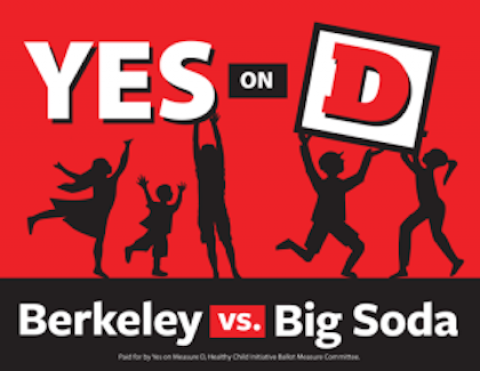On February 19th, the Dietary Guidelines Advisory Committee singled out added sugars as a major concern because of links to obesity and chronic disease. According to the panel, “Higher sugar-sweetened beverage taxes may encourage consumers to reduce sugar-sweetened beverage consumption.” The soda industry came out swinging against this recommendation because they know it will embolden more cities to consider adopting soda taxes.
The soda industry has already taken steps to prevent this from happening. Last month, they used a tactic right out of the tobacco industry’s playbook to try and stop Seattle from regulating its dangerous products. Seattle was one of six cities awarded a grant from the American Beverage Association (ABA) and the U.S. Conference of Mayors to fight childhood obesity, which is like getting a grant from the tobacco industry to fight cancer. An extra soft drink a day gives a child a 60 percent greater chance of becoming obese and sugary drinks raise the risk for developing diet-related diseases including Type 2 diabetes and heart disease. This is why communities are taking action to better protect children from the harms of sugary drinks.
Last November, Berkeley, California, became the first U.S. city to pass a law taxing sugary drinks including sodas. This victory for public health came after Big Soda had spent millions of dollars to defeat such measures in other cities. They are now on the offensive to prevent places like Seattle from following Berkeley’s example.
Researchers have found that a tax on sugary drinks is the most effective strategy to reduce childhood obesity. A tax on sugary drinks would raise significant revenue that could be invested in additional obesity prevention strategies. It was estimated that in San Francisco, a sugar-sweetened beverage tax of 2 cents per ounce could provide “up to $54 million per year in revenue for active recreation, school lunch programs, physical education and food access” in that city and its schools. Compare that to the amount of this ABA grant, which is just a fraction of the cost of one Super Bowl commercial for Coca-Cola.
This ABA grant money is coming from the profit the soda companies made off the backs of the poorest and most vulnerable people in our country. I know this from having lived in Kentucky for thirteen years before moving to Seattle this summer. I saw babies in strollers with soda in their bottles and Mountain Dew mouth is destroying the teeth of children in Appalachia.
The soda companies are trying to healthwash their profits by giving a grant to one of the wealthiest cities in America. Why? Because they know Seattle is one of the places that are progressive enough to be the next to vote in favor of a soda tax.
When cities like Berkeley and Seattle take steps to protect their citizens’ health, it has far-reaching consequences. I saw this during my time in Kentucky when the city of Lexington passed a smoking ban in 2003. I was grateful my family did not have to breathe secondhand smoke while we were there because other cities had already paved the way.
Now is the time to pave the way for soda taxes and this grant shows that Seattle is the next front in the battle. Don’t let Big Soda buy our silence and inaction. Show them their money won’t stop Seattle from doing right by its citizens and we will continue to move forward to get a soda tax on the ballot.
[Casey Hinds works to make a healthier food environment for children and instill a love of physical activity. Read more at ushealthykids.org and follow her on Twitter @caseyhinds.]


Spread the word